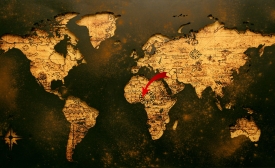war on terror

President Trump has declared terrorism defeated in Syria and Iraq, but CVE efforts increasingly need more attention in central Africa.
The media's potential for empowering marginalized communities through public diplomacy.
It turns out that the Chinese leadership has no problem with the idea of harnessing cutting-edge Western soft power for its own purposes. In fact, they seem convinced that no possible tool should be overlooked when it comes to moving the country on to the next stage in the process that China’s Little Helmsman, former leader Deng Xiaoping, decades ago designated as the era in which “to get rich is glorious."
According to a Rasmussen poll released Monday morning, more voters than ever believe terrorists have an advantage over the United States and her allies. [...] 'As incredible as it may sound, the U.S. government still lacks the capacity to coordinate its global counterterrorism strategy. This disturbing finding is reflected in two recently released reports, one by a bipartisan task force of the House Homeland Security Committee and the other, the 2015 Comprehensive Annual Report on Public Diplomacy” by the Advisory Commission on Public Diplomacy (ACPD).'
The recent rise in global terrorism is alarming, but it also reaffirms the failure of our purely hard military approach to counter the phenomenon.
There are extraordinary elements in the present U.S. policy in Iraq and Syria that are attracting surprisingly little attention. In Iraq, the U.S. is carrying out air strikes and sending in advisers and trainers to help beat back the advance of the Islamic State of Iraq and the Levant (better known as ISIS) on the Kurdish capital, Erbil. The U.S. would presumably do the same if ISIS surrounds or attacks Baghdad. But in Syria, Washington’s policy is the exact opposite: there the main opponent of ISIS is the Syrian government and the Syrian Kurds in their northern enclaves.







